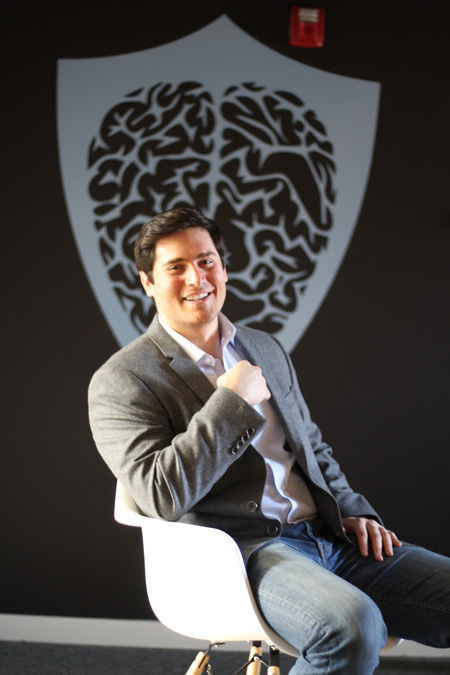
Let’s face it - the admissions process is hard to navigate. Even if you’ve had experience with it before, understanding the ins and outs of applications isn’t an easy task. We brought in Joel Butterly, Co-founder and CEO of InGenius Prep, to answer a few questions about life, admissions, and what he’s currently reading:
Where did you go to high school? College?
Hanover High School in New Hampshire; Dartmouth College; Yale Law School
How long have you been working on InGenius? What led you to start the company?
About 2.5 years. I started the company after making two important observations about the college admissions consulting industry first, that it was entirely unconsolidated. There was no “Kaplan” or “Princeton Review” – just a large number of small companies with 2-3 people in them.
Second, that the majority of individuals providing these services were not, in my opinion, qualified to do so. Simply stated: getting accepted to a top university does not qualify you to assist others. If you are accepted to a school, all you know is that what you did worked for you, at that time. You have a single observation, nothing more. Thus, we have spent years assembling that largest team of former admissions officers in the world. These are the people who actually made the decisions about who would be accepted and who would be rejected. If I were to go back in time and pay for these services, that’s who I would choose.
Approximately how many students have you worked with?
More than 1,000.
What was your first job?
In college, I worked as a personal trainer.
If you could change the common app essay question to anything, what would it be?
We’ve hired over 100 former admissions officers. I’ve spoken to hundreds more. Not once have I heard someone say that they disregarded an essay because it wasn’t “on topic” or didn’t adhere to the essay prompts. The prompts are intended to help people brainstorm, but don’t normally, in practice, serve as a restriction on what an applicant can write. I’ve seen too many students who feel constricted in writing their essay because they think that admissions offices will penalize them for straying outside of the prompt.
Thus, I wouldn’t necessarily have a specific question. I think leaving the subject matter open-ended and supplying a few examples or ideas would be a better approach. That is, the prompts should serve as examples, not as guidelines.
How do you think the college application process will change in the next 10 years?
Perhaps the most important trend is the declining importance of standardized tests. These tests were created to serve one of two purposes: evening the playing field (through standardization), and predicting success in college. At this point, we are all pretty clear on the fact that tests like the SAT or ACT serve neither purpose. I doubt anyone would be surprised if the factor most correlated with high test scores was family wealth – more so than intelligence, GPA, success in freshman year of college, etc.
Ultimately, I think standardized tests will never be entirely replaced. They are an important mechanism by which universities distinguish one another (i.e., ratings). Nonetheless, I think we will see an ever-increasing trend of diminishing or disregarding these tests as central features of the admissions process. As a result, the focus will shift to things like application essays, extra-curricular activities, performance in high school classes, letters of recommendation, and interviews.
Secondly, there are trends in the application itself. The application and admissions process seems to oscillate between two movements. First, movements for standardization – like the Common App – which are intended to benefit applicants from disadvantaged backgrounds. Second, movements for de-standardization (e.g., the Coalition) which ostensibly serve the same purpose, but plainly allow wealthier applicants to better exploit their superior resources. We seem to be trending towards this latter movement now.
I have no reason to believe that this back-and-forth will stop, as we will (unfortunately) never come to grips with the fact that our system does, and will almost certainly continue to, favor the wealthy. Thus, I think this pattern is a byproduct of largely good intentions, which can probably reduce, but is unlikely to eliminate, the systemic disadvantages created by any University selection process.
What’s the biggest thing students stress out about that they shouldn’t?
The interview. Interviews are rarely, if ever, an opportunity to get accepted. They are almost entirely an opportunity to get rejected. What I mean is that as long as you aren’t terrible, you have no need to worry. Interviewers’ write-ups are just not given that much weight unless they report something seriously wrong.
My best advice is this: remain calm, and come with good questions that will demonstrate your genuine interest in the school. Don’t try to impress them with your knowledge or resume. Just try to convince them that you are the sort of person that they would want to go to school with. That’s what they are saying when they give you a good recommendation: “I would want to go to school with this person”.
Have you ever had to fire a client? Why?
Yes. We do not see ourselves as a company providing a service with one-time value. It isn’t simply: “college application is done, see you later!” Learning to apply is an essential skill, not just for college or graduate school, but for your entire life. In the professional world, learning how to present and promote your skills and achievements is almost as important as having those skills and achievements in the first place. Thus, we see our job as more than just helping students with the college application. We see ourselves as educators.
The reason this is all relevant is simple: we do not write application for students. Ever. We have had students and families that believe that in hiring us, they were outsourcing the entire process. The reality is that we demand a lot of our students – they need to work if they are going to succeed. In some instances, families have refused to comply, and we were thus unable to work with them.
Do you have a personal motto? Favorite quote?
In front of my desk I have a framed quote from Thomas Edison. It says: “opportunity is missed by most people because it is dressed in overalls and looks like work.” I give this to all of our employees.
To me, it perfectly describes the experience of starting a company. Most people just want to discuss innovative ideas, overarching business strategy, and “disruptive technologies” – these are the people who call themselves entrepreneurs. Rarely do these people have the ability to take their ideas and make them a reality. The truth is this: starting a business is ugly. It’s hard. It’s cruel. If you aren’t willing to don the overalls and slog through the ugliness, then genuine opportunities will continue to elude you.
Favorite place in the world?
My family has a tiny cottage on an island in Maine. It has no electricity. It is the most serene place I have ever been. I am always happiest when I’m there, with my family and my fiancée.
If you could submit anything (an object, an animal, anything!) to a college admissions officer that embodies who you are, what would it be?
I would submit the framed quote from Thomas Edison that I keep on my desk. (see above)
What’s the worst piece of advice you’ve ever received?
I started two companies when I was a first year law student at Yale. As a result, I had to spend less time on my legal studies than I otherwise would. My friends saw this and tried to stage an intervention. They said: “why would you do this? You’re giving up a sure thing! You’ve got it made!”
Two years later, when they had began their comfortable law firm jobs, two of my friends called me. They said, “you were completely right, we’ve made a horrible mistake.” Their mistake was assuming that the world would hand them the “American Dream” because they graduated from Yale Law School. It doesn’t work that way. If you love working at a firm, then great. However, you’re dreaming if you think that you’ll work for someone else and one day they’ll tell you: “go ahead, work way less and take a healthy salary, you’ve earned it!”
What’s one activity / habit you wish you had time to pick up?
I really want to learn to speak Mandarin. I think it would be extremely helpful in business and in life. Sadly, I don’t have much time and I’m terrible at languages (and largely tone deaf).
How many times do you hit snooze in the morning?
None. I really like to start my day early so I’m usually up by 4:45am.
What are you reading right now?
I’m re-reading “Good to Great” by Jim Collins, which is the single best book on management that I’ve ever read.
















 Back
Back